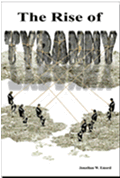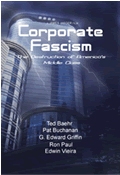PROP. 8 AND MARRIAGE LICENSING
By
Attorney Jonathan Emord
Author of "The
Rise of Tyranny" and
"Global
Censorship of Health Information"
February 13, 2012
NewsWithViews.com
On February 7, two of three judges on a panel of the United States Court of Appeals for the Ninth Circuit held California’s Proposition 8, which restricted state recognition of marriage to opposite-sex couples, unconstitutional under the Equal Protection Clause of the Fourteenth Amendment. Perry v. Brown addressed what is in fact a secondary constitutional issue. State marriage licensing laws should be held unconstitutional because they violate the Religion Clauses of the First Amendment. If state marriage licensing laws were invalidated based on the Religion Clauses, there would be no need to determine whether those laws discriminate against one class of people or another.
Under the First Amendment, and its California state law equivalent, government may not enact any law “respecting an establishment of religion, or prohibiting the free exercise thereof . . .” When state governments presume to license marriage, as almost all do, they establish a secular legal requirement, state recognition of marriage, as a condition precedent for acceptance of a religious institution and practice, marriage. Without a marriage license, no one is legally “married” under state laws that license marriage, and, so, no one is entitled to the rights and benefits the law associates with marriage, even if the marriage is recognized by a church. In this way, the state superimposes on one of the holiest covenants of the church an unconstitutional burden on the free exercise of that religious institution and practice.
Marriage licenses have been a source of great government mischief for centuries. Governments have refused to recognize marriages by particular religious institutions, have refused to recognize interdenominational marriages and interracial marriages, marriages by people who suffer mental or psychological challenges, and marriages by same sex couples. The problem with this schema is that marriage is a religious institution, indeed the holiest covenant and religious practice of almost every church, and the state necessarily imposes a burden on religious practice when it demands individuals obtain a license before their marriage is accepted and marital rights and benefits are granted. The determination of what attributes one must have to be eligible to be married and when a marriage exists is necessarily a decision of the church, not of the state.
Understood correctly, rights append to individuals, not to married couples, and are not “given” by the state but are unalienable, having been given to us by our Creator at birth. The state should neither deem certain rights available only to those who are married nor demand licensure as a condition precedent to receipt of marital rights and government benefits for married couples. Having chosen to give benefits to married couples, the state may not deny benefits to some because they object to the matrimonial union recognized by a church. Rather, they must accept the matrimonial union recognized by a church.
The state has an interest, among others, in preventing the spread of communicable disease, in ensuring that children are not abused, in ensuring that individuals who are under the age of consent do not enter into marriage, and in ensuring that marriage is not procured through fraud or is used to defraud. Those interests can be achieved through the less restrictive means of simply prohibiting the wrongful acts by statute without the state licensing marriage.
Marriage licensing has become a means for same sex couples to demand recognition from the government and receipt of marital benefits conferred by the law, and their argument for that recognition and those benefits is not insubstantial. Rather than involve government in the intellectually dishonest business of deeming some properly married and others not, the state should remove itself from the business of licensing marriage and leave it to the church to determine what constitutes a valid union. Rather than define rights and confer benefits based on marital status, rights should be limited to individuals and benefits should be conferred based on individual need without regard to marital status.
Under our First Amendment, and under the state law equivalents to it, the free exercise of religion is guaranteed. The legitimacy of a marriage is first and foremost a religious matter determined by authorities within the church. Just as the state may not constitutionally deny a church the right to determine eligibility requirements for marriage, so too the state may not second guess or demand government approval before the existence of a marriage recognized by the church is accepted in the law. The state may neither place its imprimatur behind particular kinds of marriages nor may it ban other kinds, because “marriage” is a religious institution. The state may punish all manner of crimes and harmful acts that exist inside a marriage and may even, in extreme cases, remove custody of children or incarcerate and force the separation of married individuals, but it need not declare a marriage recognized by a church to be null and void that is the proper business of the church.
Likewise, in all disunions or divorces, the state’s role should be limited to instances where parties have not been able to achieve an amicable separation or where child custody issues exist. Private divorce agreements should be honored as contracts, leaving it to religious authorities to determine whether a marriage has been annulled. Those who divorce by contract should be legally enabled to remarry without the state having to determine whether the “marriage” has been ended, albeit the state may legitimately require parties to file with the government their contracts of divorce. The state may also enact laws that presume operative statutory marriage dissolution agreements for the separation of property and determination of custody in those instances where married couples do not enter into marital contracts of their own free will. Similar to uniform partnership acts in the states, these kinds of laws would reduce issues related to property separations and child custody.
In short, marriage is a holy institution and practice. The state has no proper role in determining the existence of marriage or who may enter into a marriage. Those determinations are left by our First Amendment with religious institutions. It would be better if the state protected individual rights without creating a separate class of marital rights and made its benefits contingent on need, rather than on marital status.
| Subscribe to the NewsWithViews Daily News Alerts! |
If the state chooses to make rights and benefits contingent on marital status, it places an unconstitutional burden on religious institutions, and thereby violates the First Amendment free exercise clause, and it also invites challenges, like the one in Perry v. Brown, where one class or group denied the legal recognition of, rights associated with, and state benefits conferred on “married” couples insists on inclusion. That issue and all others are properly avoided when we recognize in the first instance that under the First Amendment government has no legitimate role in licensing religious institutions and practices, such as marriage.
� 2012 Jonathan W. Emord - All Rights Reserved













 Share
This Article
Share
This Article







